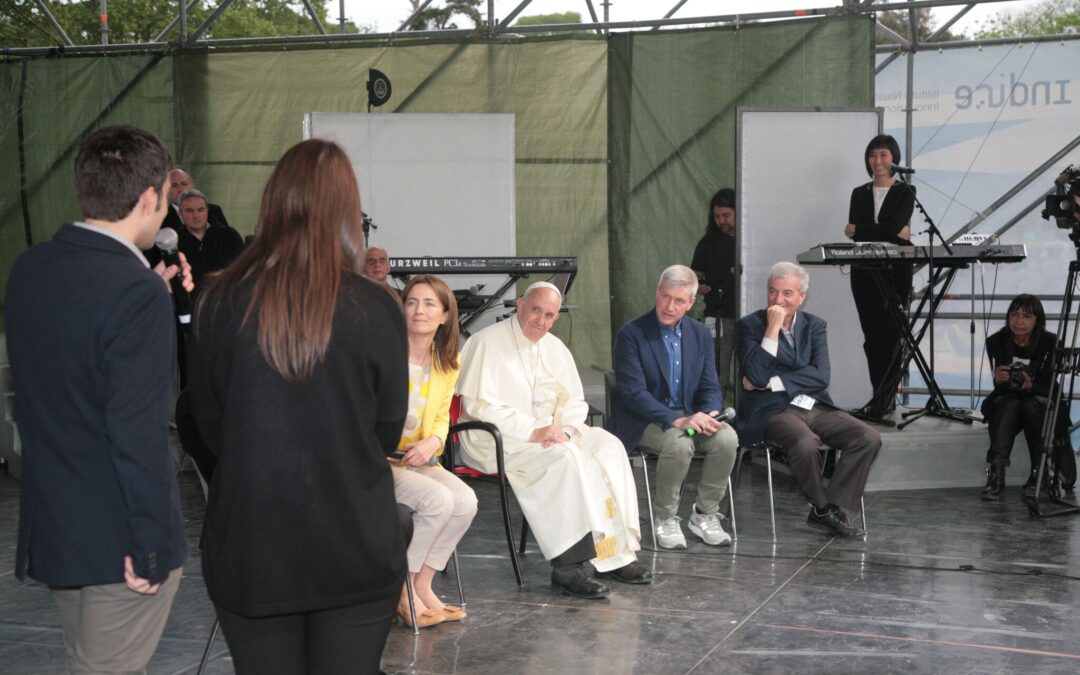
Prisons and the kids on the “external committee”
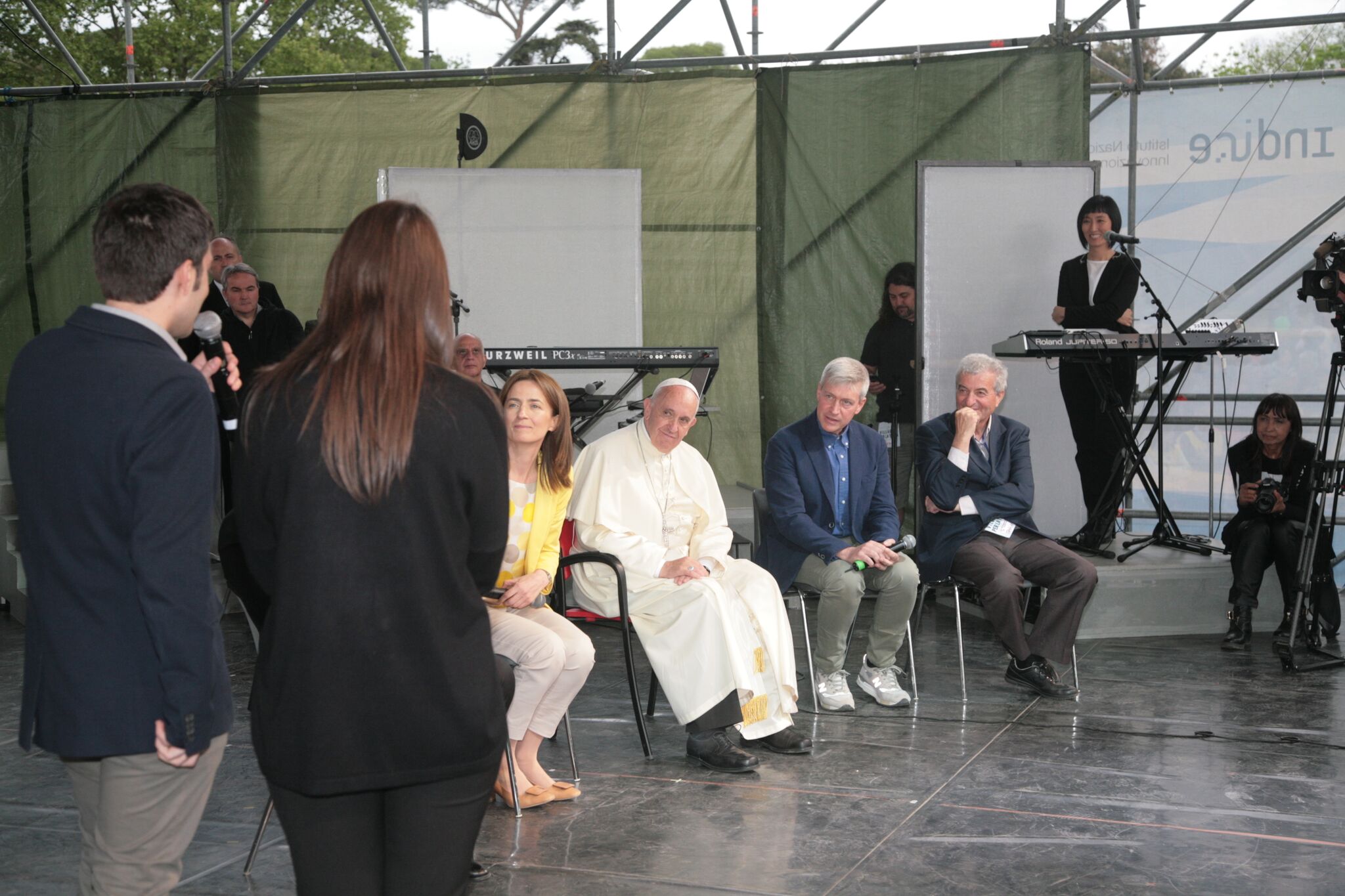 “We felt strongly that we wanted to immerse ourselves in the wounds of our city. We became inolved with Patrizia, a teacher and collaborator of Città Nuova magazine, who was writing a book about the children of prisoners and she had just met the Break the Wall Committee. This committee consists of 7 prisoners who were working to allow children to have a bit more than cold meetings with their fathers in large empty rooms. They wanted to hold celebrations and events that would leave the children with a happy memory of their fathers from whom they were separated. A collaboration of mutual trust was immediately established between us, the inmates on the committee, the teachers and the director. The first meeting with the prisoners took place at Christmas 2014. I was struck when the police ordered us to leave all our personal possessions behind before crossing the prison gate. We took his words to mean our prejudices as well. The detainees couldn’t believe that so many young people would spend a Saturday morning with them. Since the day of that celebration something more than a volunteer programme began: a true and deep relationship with the detainees themselves.As we described what we were doing, one of them remarked that it took a lot of courage. But for us it was a matter of trust in others even though they had committed a crime and of hope that they can change and begin again. We remember the joy of that detainee who was glad to be able to invest his talents in something legal that was not for profit – as were the illegal activities that he had been engaged in before. For him who had no children of his own, working for the children filled him with a sense of satisfaction. Last year we met with the detainees on the committee to plan another event. A thank you note they wrote conveys their joy and enthusiasm over that meeting where we were able to sit down together as if we weren’t inside the walls of a prison. We also had a snack together, yes, because they gave us a warm welcome as you would among old friends. Now they call us ‘the kids on the external committee’. At that meeting they opened up and shared with us the practical effects of inprisonment on their daily life. For example, they said that people in prison aren’t able to bring the background into focus; their eyes need to reacquire the ability to look ahead, having lost the possibility to see the horizon. One of them said goodbye to us in a note; “To the youngsters I say continue to dedicate yourselves to this activity, because often the ones who are inside need only to see that there is someone on the outside who is interested in our problems so they can have a second chance. On my part, I thank you for that.” Last March, for Father’s Day, we organised games and other activities in the mornings and afternoons. Half a day of simple things that allowed their usually divided families to spend some time together, and for their children to cherish fond memories in the area of the so delicate and difficult relationships with their fathers. Some of them were present during the visit Pope Francis made on Holy Thursday last year, and they attrended the Mass and told us how moving it was for them. It has remained a precious memory for them. They often tell us that ‘Prison takes away your feelings along with your freedom’. But perhaps now something has changed: there’s the joy of meeting and working together without any prejudice. In them we’ve discovered the face of Jesus the prisoner, Jesus the marginalised. Every time we’re leaving Rebibbia Prison we feel that we’ve learnt to have the courage to change, to admit our own mistakes and to begin again.We feel God’s personal love and His immense Mercy.”
“We felt strongly that we wanted to immerse ourselves in the wounds of our city. We became inolved with Patrizia, a teacher and collaborator of Città Nuova magazine, who was writing a book about the children of prisoners and she had just met the Break the Wall Committee. This committee consists of 7 prisoners who were working to allow children to have a bit more than cold meetings with their fathers in large empty rooms. They wanted to hold celebrations and events that would leave the children with a happy memory of their fathers from whom they were separated. A collaboration of mutual trust was immediately established between us, the inmates on the committee, the teachers and the director. The first meeting with the prisoners took place at Christmas 2014. I was struck when the police ordered us to leave all our personal possessions behind before crossing the prison gate. We took his words to mean our prejudices as well. The detainees couldn’t believe that so many young people would spend a Saturday morning with them. Since the day of that celebration something more than a volunteer programme began: a true and deep relationship with the detainees themselves.As we described what we were doing, one of them remarked that it took a lot of courage. But for us it was a matter of trust in others even though they had committed a crime and of hope that they can change and begin again. We remember the joy of that detainee who was glad to be able to invest his talents in something legal that was not for profit – as were the illegal activities that he had been engaged in before. For him who had no children of his own, working for the children filled him with a sense of satisfaction. Last year we met with the detainees on the committee to plan another event. A thank you note they wrote conveys their joy and enthusiasm over that meeting where we were able to sit down together as if we weren’t inside the walls of a prison. We also had a snack together, yes, because they gave us a warm welcome as you would among old friends. Now they call us ‘the kids on the external committee’. At that meeting they opened up and shared with us the practical effects of inprisonment on their daily life. For example, they said that people in prison aren’t able to bring the background into focus; their eyes need to reacquire the ability to look ahead, having lost the possibility to see the horizon. One of them said goodbye to us in a note; “To the youngsters I say continue to dedicate yourselves to this activity, because often the ones who are inside need only to see that there is someone on the outside who is interested in our problems so they can have a second chance. On my part, I thank you for that.” Last March, for Father’s Day, we organised games and other activities in the mornings and afternoons. Half a day of simple things that allowed their usually divided families to spend some time together, and for their children to cherish fond memories in the area of the so delicate and difficult relationships with their fathers. Some of them were present during the visit Pope Francis made on Holy Thursday last year, and they attrended the Mass and told us how moving it was for them. It has remained a precious memory for them. They often tell us that ‘Prison takes away your feelings along with your freedom’. But perhaps now something has changed: there’s the joy of meeting and working together without any prejudice. In them we’ve discovered the face of Jesus the prisoner, Jesus the marginalised. Every time we’re leaving Rebibbia Prison we feel that we’ve learnt to have the courage to change, to admit our own mistakes and to begin again.We feel God’s personal love and His immense Mercy.”
Maria Voce and Jesús Morán in Kenya
Itinerary:
- Welcome celebration at Mariapolis Piero
- May 17-20: School of Inculturation
- May 21-22: New Families Pan-African Meeting
- May 25: Visit to the Academic Council of the Catholic University of Eastern Africa (CUEA)
- May 27: Presentation at the Ecumenical Commission
- May 28-29: Meeting with the Focolare communities from Burundi, Rwanda, Uganda and Tanzania, and inauguration of Mary of the Light Church in Kenya.
Loppiano – Retreat for Consecrated Women
In the Year of Mercy, Consecrated Women who belong to the Focolare Movement will hold a week of Spiritual Exercises at their Casa Emmaus Centre in the Focolare town of Loppiano, Italy. “It will be an opportunity for the women to deepen their own charisms in the light of the spirituality of unity,” explains Sister Antonia Moioli, “and in this context to experience the relationship that exists amongst the charisms. Brochure
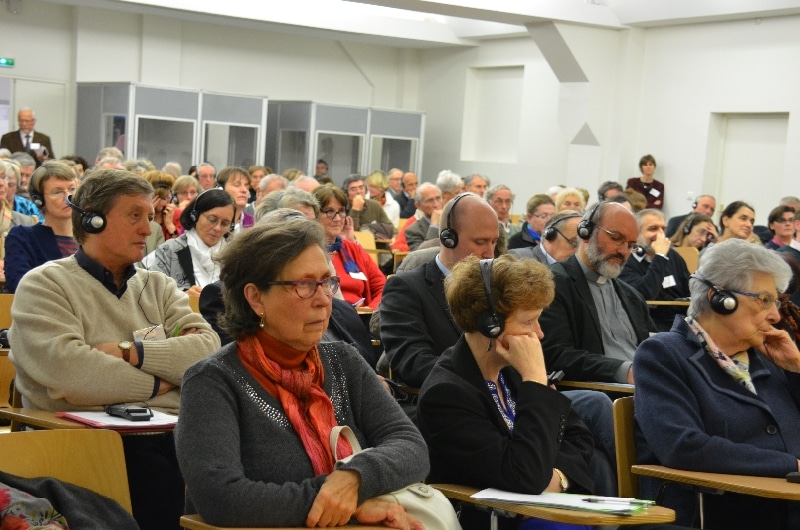
Europe Day. The Focolare Movement promotes an event.
 “Resignation and weariness do not belong to the soul of Europe; even our problems can become powerful forces of unity” For the majority of Europeans, May 9 is an occasion to celebrate the values of integration, unity and peace, as this date marks the anniversary of the historical Schuman declaration that gave birth to the European Union; but for others it marks the time when Stalin declared victory over Germany on May 9, 1945 and rights started to be deprived under the Soviet rule. The innovative process of integration, which Europe dared to start sixty years ago, should be confronted against this historical background even today. Considering the present crisis and the contradictions inherent in the cultural and social paradigms that peoples in Europe are experiencing, one is bound to ask: is the European experience still valid? Do Europeans still want to be together? For Pasquale Ferrara, a diplomat, a scholar and a lecturer in International Relations and Diplomacy, “the European vision of integration – which consists of bringing together not so much the leaderships, but the political will of the different countries to govern jointly over phenomena that are beyond control of individual states – is still one of great insight”. Through integration “Europe demonstrates that even today multilateralism can have an added value if attention is not centred on the state but on the political function it performs to provide for the needs of its citizens in a global and transnational world”.
“Resignation and weariness do not belong to the soul of Europe; even our problems can become powerful forces of unity” For the majority of Europeans, May 9 is an occasion to celebrate the values of integration, unity and peace, as this date marks the anniversary of the historical Schuman declaration that gave birth to the European Union; but for others it marks the time when Stalin declared victory over Germany on May 9, 1945 and rights started to be deprived under the Soviet rule. The innovative process of integration, which Europe dared to start sixty years ago, should be confronted against this historical background even today. Considering the present crisis and the contradictions inherent in the cultural and social paradigms that peoples in Europe are experiencing, one is bound to ask: is the European experience still valid? Do Europeans still want to be together? For Pasquale Ferrara, a diplomat, a scholar and a lecturer in International Relations and Diplomacy, “the European vision of integration – which consists of bringing together not so much the leaderships, but the political will of the different countries to govern jointly over phenomena that are beyond control of individual states – is still one of great insight”. Through integration “Europe demonstrates that even today multilateralism can have an added value if attention is not centred on the state but on the political function it performs to provide for the needs of its citizens in a global and transnational world”.  “A Europe that is able to stay together and thus rediscover what more can be done for the world in a better way” – these words of Maria Voce summerize the Focolare Movement’s perspective while contributing towards ongoing processes in Europe. An example of this commitment is “Together for Europe”, which brings together more than 300 communities and movements that belong to different Christian Churches. These form a network which pursues shared goals and promotes a culture of reciprocity, which stimulates individuals and peoples to welcome and get to know each other, to be reconciled and to offer mutual support. “’Together for Europe’ is not an end in itself, but its nature is exquisitely political in the noblest sense of the word: it strives for the good of that part of humanity which is Europe; it aims at the revival of its roots and at its awareness to contribute to the rest of the world” . “Together for Europe” is organizing a European event that will take place in Munich from June 30 to July 2, 2016. During the first two days, 36 round tables and forums will offer the opportunity to share experiences and views on issues concerning Europe. An outdoor rally will conclude the event on the third day. Pope Francis and the Ecumenical Patriarch Bartholomew I will be present through their video messages. Jean-Claude Junker, President of the European Commission, and Thorbjørn Jagland, Secretary General of the Council of Europe, granted their patronage. (http://www.together4europe.org/). “At a time when Europe is mostly needed, the more it seems to lack the ability to face these challenges”, comments Ferrara, while referring to the lack of political figures with a broad vision. He concludes: “But, are we looking in the wrong direction? Maybe we think that one or more political leaders are needed, while instead we must give more value to civil society, focusing more on youth and their social and political creativity, on their ability to imagine the “Old” continent as a “new” one”. Source: Press releases
“A Europe that is able to stay together and thus rediscover what more can be done for the world in a better way” – these words of Maria Voce summerize the Focolare Movement’s perspective while contributing towards ongoing processes in Europe. An example of this commitment is “Together for Europe”, which brings together more than 300 communities and movements that belong to different Christian Churches. These form a network which pursues shared goals and promotes a culture of reciprocity, which stimulates individuals and peoples to welcome and get to know each other, to be reconciled and to offer mutual support. “’Together for Europe’ is not an end in itself, but its nature is exquisitely political in the noblest sense of the word: it strives for the good of that part of humanity which is Europe; it aims at the revival of its roots and at its awareness to contribute to the rest of the world” . “Together for Europe” is organizing a European event that will take place in Munich from June 30 to July 2, 2016. During the first two days, 36 round tables and forums will offer the opportunity to share experiences and views on issues concerning Europe. An outdoor rally will conclude the event on the third day. Pope Francis and the Ecumenical Patriarch Bartholomew I will be present through their video messages. Jean-Claude Junker, President of the European Commission, and Thorbjørn Jagland, Secretary General of the Council of Europe, granted their patronage. (http://www.together4europe.org/). “At a time when Europe is mostly needed, the more it seems to lack the ability to face these challenges”, comments Ferrara, while referring to the lack of political figures with a broad vision. He concludes: “But, are we looking in the wrong direction? Maybe we think that one or more political leaders are needed, while instead we must give more value to civil society, focusing more on youth and their social and political creativity, on their ability to imagine the “Old” continent as a “new” one”. Source: Press releases
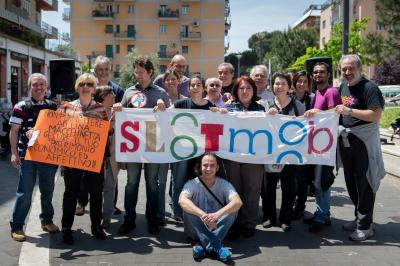
Slotmob: A small idea that’s growing
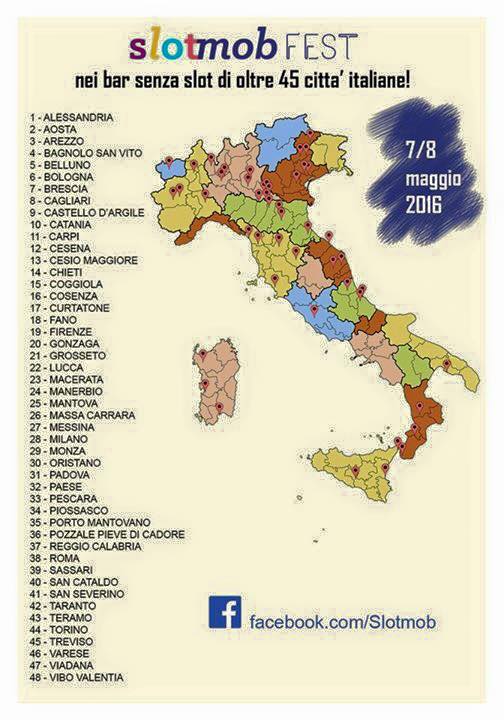 It was the summer of 2013 when an idea came up among some teenagers from Rome of doing something to curb the proliferation of gambling in the city. It was becoming more and more common to see both old and young people glued to the slot machines that are found in many Italian bars. Despite the economic crisis, in recent years the supply and consumption of gambling in Italy has increased dramatically. Italians spend 85 billion a year on the more than 50,000 latest generation slot machines, and the latest estimates are that more than 800,000 people suffer from gambling addiction. We see how the gambling business is devastating our cities, depleting the fabric of society and creating isolation and loneliness. At the helm of this exponential growth of gambling is an economic vision in which the only thing that matters is profit for the multinationals with the consent from a state that also sees it as an opportunity for profit. In front of such a bleak scene the teenagers from Rome wondered what they could do . . . and from there came the idea of rewarding the barkeepers who have chosen not to make gambling available at their establishments. They went to breakfast at their bars en masse as a Slotmob. Initially they proposed doing it in Rome and Milan, but the simple and practical idea fascinated many Italians from north to south of the peninsula. There have been 120 Slotmobs in the past two and a half years, with the participation of over 10,000 people and a network of more than 200 associations. The project has created relationships with very diverse groups, created meeting spaces, awareness and mended the social bond that gambling had disintegrated. “In Rome we concentrated our efforts on an area known as the Italian Las Vegas,” Maria Chiara explains. “In a short time a network was formed with 7 local associations that deal with different aspects of gambling. A sincere relationship was created, not without the usual difficulties of working with one another. That’s how the Let’s Not Gamble Ourselves Project began and now involves several city schools. Talking to teenagers about the power of our choices and of how we can change unjust situations beginning from ourselves, is not in fact very easy. But it actually is important to build a more just world and to involve young people in the change process.”
It was the summer of 2013 when an idea came up among some teenagers from Rome of doing something to curb the proliferation of gambling in the city. It was becoming more and more common to see both old and young people glued to the slot machines that are found in many Italian bars. Despite the economic crisis, in recent years the supply and consumption of gambling in Italy has increased dramatically. Italians spend 85 billion a year on the more than 50,000 latest generation slot machines, and the latest estimates are that more than 800,000 people suffer from gambling addiction. We see how the gambling business is devastating our cities, depleting the fabric of society and creating isolation and loneliness. At the helm of this exponential growth of gambling is an economic vision in which the only thing that matters is profit for the multinationals with the consent from a state that also sees it as an opportunity for profit. In front of such a bleak scene the teenagers from Rome wondered what they could do . . . and from there came the idea of rewarding the barkeepers who have chosen not to make gambling available at their establishments. They went to breakfast at their bars en masse as a Slotmob. Initially they proposed doing it in Rome and Milan, but the simple and practical idea fascinated many Italians from north to south of the peninsula. There have been 120 Slotmobs in the past two and a half years, with the participation of over 10,000 people and a network of more than 200 associations. The project has created relationships with very diverse groups, created meeting spaces, awareness and mended the social bond that gambling had disintegrated. “In Rome we concentrated our efforts on an area known as the Italian Las Vegas,” Maria Chiara explains. “In a short time a network was formed with 7 local associations that deal with different aspects of gambling. A sincere relationship was created, not without the usual difficulties of working with one another. That’s how the Let’s Not Gamble Ourselves Project began and now involves several city schools. Talking to teenagers about the power of our choices and of how we can change unjust situations beginning from ourselves, is not in fact very easy. But it actually is important to build a more just world and to involve young people in the change process.”  Maria Chiara continues: “The Slotmob experience is making us meet many people, many stories that show us that gambling is an open wound on our society. During one Slotmob a man that had helped us to organise some games with the young people took the microphone and told his own experience as a regular gambler. He said to us: ‘My life is made of bright spots and shadows, and what makes me gamble is the solitude. But today seeing all of you here I no longer feel alone. So I commit to stop gambling. If you see me in front of a slot machine, you’re authorised to reprimand me and remind me of this promise I make today’.” “When we look back,” Maria Chiara concludes, “we see that we’ve had unimagined results. Two laws were blocked that would have reduced the power of mayors in limiting gambling; we got a partial ban on television advertising, and increased media attention on the problem of gambling. We’re aware that we have a long road ahead of us, we’d like advertising for gambling to be completely banned and we want to re-open the discussion on whether gambling should be in the hands of multinationals. For this reason on May 7 we will be on more than 40 public squares across Italy restating our yes to a different economy and rewarding bars that have said no to gambling.”
Maria Chiara continues: “The Slotmob experience is making us meet many people, many stories that show us that gambling is an open wound on our society. During one Slotmob a man that had helped us to organise some games with the young people took the microphone and told his own experience as a regular gambler. He said to us: ‘My life is made of bright spots and shadows, and what makes me gamble is the solitude. But today seeing all of you here I no longer feel alone. So I commit to stop gambling. If you see me in front of a slot machine, you’re authorised to reprimand me and remind me of this promise I make today’.” “When we look back,” Maria Chiara concludes, “we see that we’ve had unimagined results. Two laws were blocked that would have reduced the power of mayors in limiting gambling; we got a partial ban on television advertising, and increased media attention on the problem of gambling. We’re aware that we have a long road ahead of us, we’d like advertising for gambling to be completely banned and we want to re-open the discussion on whether gambling should be in the hands of multinationals. For this reason on May 7 we will be on more than 40 public squares across Italy restating our yes to a different economy and rewarding bars that have said no to gambling.”
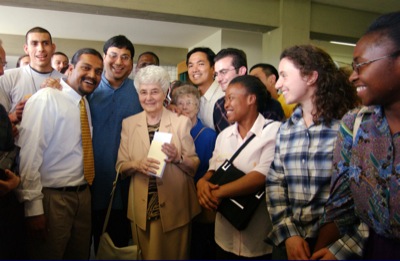
Chiara Lubich and Youth for a United World
 “Dear Youth for a United World, I know that you hoped to receive a message from me that would contribute towards the success of United World Week. What subject have I chosen to speak on? There couldn’t be a better one than your very own goal of achieving a united world. Is it reasonable to talk about a united world? Is it possible to imagine a united world? Can we hope that the attention we give and the energy we use will one day play a significant role in reaching such an objective? Or is it a utopia, something unattainable and fantastical, as some people might think? Many signs today point to the fact that the world is heading towards this goal. First of all, there is the conviction that unity is a sign of the times. This means that those who are particularly able and competent in discerning the times we live in confirm that the world is moving towards unity. Some of you may remember that I too have spoken about this very often, examining the religious aspect in particular. Today’s drive towards unity, however, does not only involve the religious field, but also the political world. Apart from the United Nations, where almost all the states of the world are represented, there is the Organization of African Unity in Africa, for example, that is, an association of African states. In Asia there are various associations of states like the Islamic Conference Organization which includes 53 Muslim countries; the Southeast Asia Treaty Organization, and others. In America there is the Organization of American States (of North, Central and South America), and the Latin American Integration Association. In Europe we have the Organization for European Economic Cooperation which also includes the countries of Eastern Europe, and the European Union. In addition, many wise people from different cultures in the world have expressed their thoughts on this subject. I would have liked to quote them but I don’t have access to them here in Brazil, from where I am sending this message. I found some thoughts by the most recent Popes. Besides being authoritative, the Popes are also holy, and so what they say can be of interest to everyone in the world. Pius XII, John XXIII and Paul VI have very similar ideas. In Populorum Progressio, Paul VI says: “Who cannot see the need to reach, by degrees, the establishment of a worldwide authority that can act effectively on the juridical and political levels?” The present Pope expressed himself in these terms at our Genfest ’90: “Truly, this seems to be the perspective emerging from the multiple signs of our times: the perspective of a united world. This is the great expectation of people today, the hope, and at the same time, the great challenge for the future. It is evident we are moving towards unity at an ever increasing speed.” My dear young people, you are striving and working for a united world. What are you doing to reach this goal? You are involved in activities which, although meaningful, might appear very small in comparison with your proposed objective. When you are older, perhaps some of you will be more directly involved in the various organizations which contribute to building a united world. Although all these activities and efforts will be very helpful, I don’t think that any of them will play a determining role in reaching this goal. Instead, the deciding factor in the journey towards unity we are involved in, is that of giving a soul to the world. And this soul is love. You must start a revolution of love around you, in all the countries you are living in. Today it is not enough to organise charity or welfare programs, although through such activities we can give to others out of love. Today we must “be love”, that is, we must feel what the other person is feeling, live the other, the others, and aim at achieving unity in accordance with our spirituality which, like a fire, has already been enkindled in varying measures, thanks to you too, all over the globe. John Paul II also said at the Genfest ‘90: “Be aware – and I say it again – that the path towards a united world, which is the path of peace, is founded on building relationships of solidarity, and solidarity has its roots in charity” (in love). Thus we must build relationships of unity, which have their roots in love. You must live out this love first of all among yourselves, so as to reach the point of living it with many, many others, wherever you go: with the people you meet every day, and with those who determine the course of events, in various institutions, and in big and small organizations around the world… everywhere. Only then will they fulfill the purpose for which they were established; only then will we truly work for a united world. Take courage, then, youth for a united world. You are following the most fascinating and splendid ideal on earth. And you are not alone! You, who are proud to be called Christians, know that by acting in this way, Christ is among you. Each and every one of you, of every belief and creed, knows that unity is strength. Go ahead then, begin or continue with your characteristic enthusiasm and determination. I, all of us, are with you… for the final victory, whenever God wills. But who will gather if no one sows? This is your task now at this time in history. And all things considered, there are promising signs that the goal you are living for is not far-off.” Chiara Lubich
“Dear Youth for a United World, I know that you hoped to receive a message from me that would contribute towards the success of United World Week. What subject have I chosen to speak on? There couldn’t be a better one than your very own goal of achieving a united world. Is it reasonable to talk about a united world? Is it possible to imagine a united world? Can we hope that the attention we give and the energy we use will one day play a significant role in reaching such an objective? Or is it a utopia, something unattainable and fantastical, as some people might think? Many signs today point to the fact that the world is heading towards this goal. First of all, there is the conviction that unity is a sign of the times. This means that those who are particularly able and competent in discerning the times we live in confirm that the world is moving towards unity. Some of you may remember that I too have spoken about this very often, examining the religious aspect in particular. Today’s drive towards unity, however, does not only involve the religious field, but also the political world. Apart from the United Nations, where almost all the states of the world are represented, there is the Organization of African Unity in Africa, for example, that is, an association of African states. In Asia there are various associations of states like the Islamic Conference Organization which includes 53 Muslim countries; the Southeast Asia Treaty Organization, and others. In America there is the Organization of American States (of North, Central and South America), and the Latin American Integration Association. In Europe we have the Organization for European Economic Cooperation which also includes the countries of Eastern Europe, and the European Union. In addition, many wise people from different cultures in the world have expressed their thoughts on this subject. I would have liked to quote them but I don’t have access to them here in Brazil, from where I am sending this message. I found some thoughts by the most recent Popes. Besides being authoritative, the Popes are also holy, and so what they say can be of interest to everyone in the world. Pius XII, John XXIII and Paul VI have very similar ideas. In Populorum Progressio, Paul VI says: “Who cannot see the need to reach, by degrees, the establishment of a worldwide authority that can act effectively on the juridical and political levels?” The present Pope expressed himself in these terms at our Genfest ’90: “Truly, this seems to be the perspective emerging from the multiple signs of our times: the perspective of a united world. This is the great expectation of people today, the hope, and at the same time, the great challenge for the future. It is evident we are moving towards unity at an ever increasing speed.” My dear young people, you are striving and working for a united world. What are you doing to reach this goal? You are involved in activities which, although meaningful, might appear very small in comparison with your proposed objective. When you are older, perhaps some of you will be more directly involved in the various organizations which contribute to building a united world. Although all these activities and efforts will be very helpful, I don’t think that any of them will play a determining role in reaching this goal. Instead, the deciding factor in the journey towards unity we are involved in, is that of giving a soul to the world. And this soul is love. You must start a revolution of love around you, in all the countries you are living in. Today it is not enough to organise charity or welfare programs, although through such activities we can give to others out of love. Today we must “be love”, that is, we must feel what the other person is feeling, live the other, the others, and aim at achieving unity in accordance with our spirituality which, like a fire, has already been enkindled in varying measures, thanks to you too, all over the globe. John Paul II also said at the Genfest ‘90: “Be aware – and I say it again – that the path towards a united world, which is the path of peace, is founded on building relationships of solidarity, and solidarity has its roots in charity” (in love). Thus we must build relationships of unity, which have their roots in love. You must live out this love first of all among yourselves, so as to reach the point of living it with many, many others, wherever you go: with the people you meet every day, and with those who determine the course of events, in various institutions, and in big and small organizations around the world… everywhere. Only then will they fulfill the purpose for which they were established; only then will we truly work for a united world. Take courage, then, youth for a united world. You are following the most fascinating and splendid ideal on earth. And you are not alone! You, who are proud to be called Christians, know that by acting in this way, Christ is among you. Each and every one of you, of every belief and creed, knows that unity is strength. Go ahead then, begin or continue with your characteristic enthusiasm and determination. I, all of us, are with you… for the final victory, whenever God wills. But who will gather if no one sows? This is your task now at this time in history. And all things considered, there are promising signs that the goal you are living for is not far-off.” Chiara Lubich
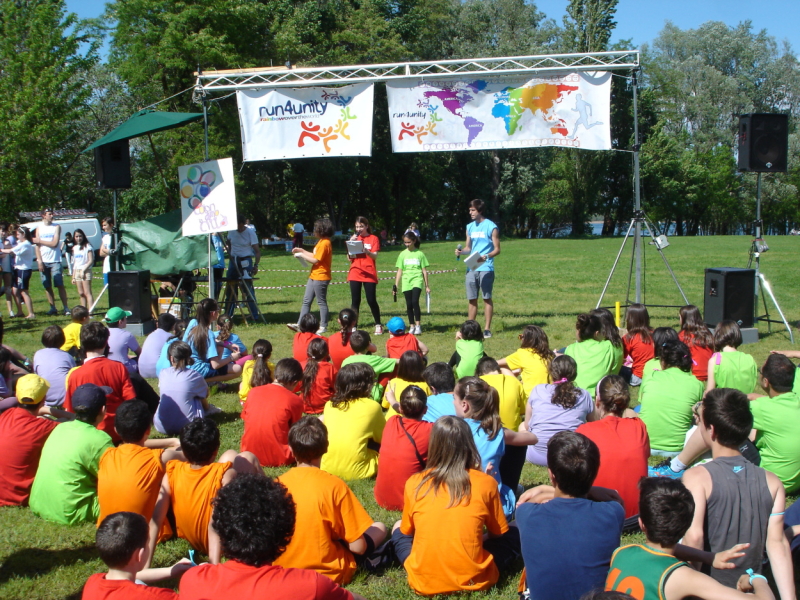
Run4Unity 2016 #4peace
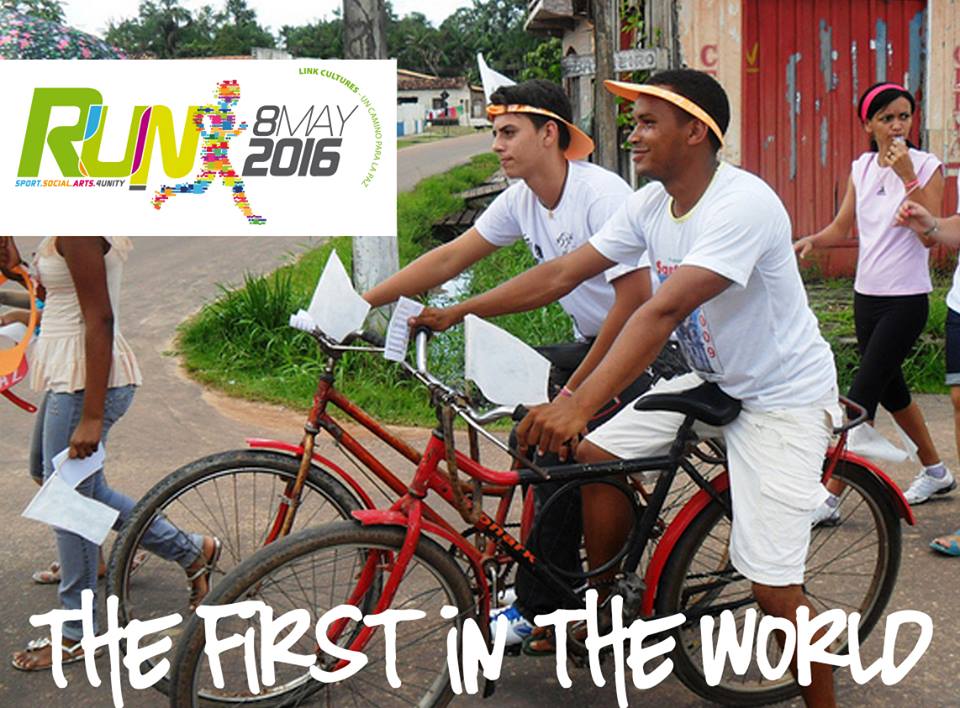 It’s a global relay race in the name of peace and unity between peoples along the world’s most dangerous borders. From the US-Mexico border to the one separating Hungary and Austria, where were raised protective that people attempt to cross in the hope of a better future, putting their life at risk. It’s called Run4unity , promoted on Sunday May 8 by hundreds of thousands of young boys and girls from the Focolari Movement in all corners of the globe. From 11:00 to 12:00 they will follow a track by foot or by bike, with rollers, by boat. A time-out will follow, along with a minute of silence or a prayer for peace. “Youths for unity” in Mexico have decided to run across Mexicali, 3.500 km from Mexico City, on the border with the United States. They will be running along the wall that divides the two peoples, in memory of all those who lost their lives in the attempt to cross the border, finding themselves in a desert land. The initiative, included in the school program, involves 10 schools with 1500 pupils. It is promoted by a team of physical education teachers coordinated by the local school inspector. Across the ocean, Hungarian youths responded to their Mexicali “friends” with a relay race held Sunday May 1st in Sopron, on the Austria-Slovakian border. Last year the city hit world news as a destination of migrants desperately trying to enter Austria by train from Budapest. The relay took place with the participation of young Afghan refugees from a nearby refugee camp.
It’s a global relay race in the name of peace and unity between peoples along the world’s most dangerous borders. From the US-Mexico border to the one separating Hungary and Austria, where were raised protective that people attempt to cross in the hope of a better future, putting their life at risk. It’s called Run4unity , promoted on Sunday May 8 by hundreds of thousands of young boys and girls from the Focolari Movement in all corners of the globe. From 11:00 to 12:00 they will follow a track by foot or by bike, with rollers, by boat. A time-out will follow, along with a minute of silence or a prayer for peace. “Youths for unity” in Mexico have decided to run across Mexicali, 3.500 km from Mexico City, on the border with the United States. They will be running along the wall that divides the two peoples, in memory of all those who lost their lives in the attempt to cross the border, finding themselves in a desert land. The initiative, included in the school program, involves 10 schools with 1500 pupils. It is promoted by a team of physical education teachers coordinated by the local school inspector. Across the ocean, Hungarian youths responded to their Mexicali “friends” with a relay race held Sunday May 1st in Sopron, on the Austria-Slovakian border. Last year the city hit world news as a destination of migrants desperately trying to enter Austria by train from Budapest. The relay took place with the participation of young Afghan refugees from a nearby refugee camp.  Over 100 thousand adolescents have participated in the initiative held in previous years. From the islands of Wallis and Futuna in the Pacific Ocean to Cairo, the baton passes from time zone to time zone to kick off sporting events, solidarity actions and active citizenship experiences in places marked by loneliness, poverty, marginalization. In the city of Bari, (Italy) the initiative will take place in the Fornelli juvenile penitentiary with a four-way football tournament, while in another Italian town the young people decided to visit the reception centre for asylum-seekers. Wherever they will be running, “their flag” will bear the “Golden rule”: “Do unto others as you would have them do unto you and Do not do unto others what you would not have them do unto you.” It’s an ethical principle that is found in almost all cultures and religions – they said -. From Judaism to Islam, as well as in the most ancient African traditions. If the world stopped on Sunday, and were handed over to these young people to govern, perhaps many fears would be dispelled, tensions would ebb, many tears would be wiped off and a rainbow of peace would cross the world. Obviously, one hour is not enough to accomplish this “dream.” And from Sunday the world will start spinning as it always did. But they won’t, these young people will remain. They have learned to see the world with different eyes. They are already capable of following it going to those places where humanity is facing major historical challenges. Indeed, they are the future and represent hope. They are asking us and working towards a world where humankind will be as brothers and sisters. Perhaps it is worthwhile listening to them. Source: SIR
Over 100 thousand adolescents have participated in the initiative held in previous years. From the islands of Wallis and Futuna in the Pacific Ocean to Cairo, the baton passes from time zone to time zone to kick off sporting events, solidarity actions and active citizenship experiences in places marked by loneliness, poverty, marginalization. In the city of Bari, (Italy) the initiative will take place in the Fornelli juvenile penitentiary with a four-way football tournament, while in another Italian town the young people decided to visit the reception centre for asylum-seekers. Wherever they will be running, “their flag” will bear the “Golden rule”: “Do unto others as you would have them do unto you and Do not do unto others what you would not have them do unto you.” It’s an ethical principle that is found in almost all cultures and religions – they said -. From Judaism to Islam, as well as in the most ancient African traditions. If the world stopped on Sunday, and were handed over to these young people to govern, perhaps many fears would be dispelled, tensions would ebb, many tears would be wiped off and a rainbow of peace would cross the world. Obviously, one hour is not enough to accomplish this “dream.” And from Sunday the world will start spinning as it always did. But they won’t, these young people will remain. They have learned to see the world with different eyes. They are already capable of following it going to those places where humanity is facing major historical challenges. Indeed, they are the future and represent hope. They are asking us and working towards a world where humankind will be as brothers and sisters. Perhaps it is worthwhile listening to them. Source: SIR

May 1 in Loppiano: less walls and more synergies
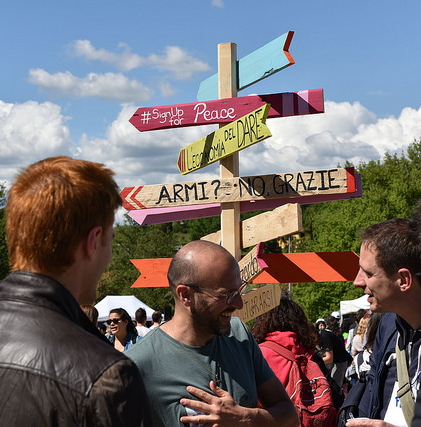 “Where was I?” was the refrain of the song inspired by the migration tragedy, and sung by the Gen Verde on the stage of the May 1 event of Loppiano (Florence). The question resounded strongly among the 1,200 participants of the feast day, but it also pertained to commitment to suffering humanity, for example in Aleppo, with the escalation of bombs and deaths which have beset the city for the last 10 days, and likewise for the populations devastated by the earthquake in Ecuador, who asked to live and return to their normal lives. It is a commitment also of the multitude of associations and initiatives operating on the front of integration in Italy. “The aim of this day – explained the Youth for a United World – is to highlight the flow of initiatives undertaken throughout Italy, in the name of reception, lawfulness, politics lived as a service, and care for the environment, which in one word means: fraternity.” “Ever since the bombings started again, a chain of solidarity has begun among the people – Tarek of Aleppo, Syria, recounted. This reveals the quality of my people, who do not give up, but whose dignity is wounded. We say, stop the war, and ask with faith for the gift of peace.» Lubna instead explains: «In Jordan there are three million refugees, half of which are Syrians. They arrive with despair in their eyes, and the absence of hope. We try to share the life of fear they have faced, by giving them love and a sense of family.» Wa’el Suleiman, Director of Caritas in Jordan, addressed the people with a heartfelt appeal in a video shoot: «Work with us to stop the war, come to the Middle East and help us rebuild our countries, so that the people do not have to escape, and emigrate. We want to live in our lands.” Nahomy and Maria are both Ecuadorians, They recounted the extraordinary strength of their people: “The pain of those who had lost all their belongings, became the suffering of all. The inmates of a prison started to build wooden coffins, people of different political ideologies teamed up together, the cooks became heroes by preparing a warm meal for everyone, and the poor shared the little they had.” A festive atmosphere and lots of music accompanied the stories of the youth who have decided to actively take part in the building of a different world. “«I am weary of clashes, and diatribes in politics and also in daily life – a boy wrote on the great “wall” on which each could leave behind that part of himself that hinders the flow of fraternity – the only things I take interest in and for which I want to live are those things that unite and not those that divide us.”
“Where was I?” was the refrain of the song inspired by the migration tragedy, and sung by the Gen Verde on the stage of the May 1 event of Loppiano (Florence). The question resounded strongly among the 1,200 participants of the feast day, but it also pertained to commitment to suffering humanity, for example in Aleppo, with the escalation of bombs and deaths which have beset the city for the last 10 days, and likewise for the populations devastated by the earthquake in Ecuador, who asked to live and return to their normal lives. It is a commitment also of the multitude of associations and initiatives operating on the front of integration in Italy. “The aim of this day – explained the Youth for a United World – is to highlight the flow of initiatives undertaken throughout Italy, in the name of reception, lawfulness, politics lived as a service, and care for the environment, which in one word means: fraternity.” “Ever since the bombings started again, a chain of solidarity has begun among the people – Tarek of Aleppo, Syria, recounted. This reveals the quality of my people, who do not give up, but whose dignity is wounded. We say, stop the war, and ask with faith for the gift of peace.» Lubna instead explains: «In Jordan there are three million refugees, half of which are Syrians. They arrive with despair in their eyes, and the absence of hope. We try to share the life of fear they have faced, by giving them love and a sense of family.» Wa’el Suleiman, Director of Caritas in Jordan, addressed the people with a heartfelt appeal in a video shoot: «Work with us to stop the war, come to the Middle East and help us rebuild our countries, so that the people do not have to escape, and emigrate. We want to live in our lands.” Nahomy and Maria are both Ecuadorians, They recounted the extraordinary strength of their people: “The pain of those who had lost all their belongings, became the suffering of all. The inmates of a prison started to build wooden coffins, people of different political ideologies teamed up together, the cooks became heroes by preparing a warm meal for everyone, and the poor shared the little they had.” A festive atmosphere and lots of music accompanied the stories of the youth who have decided to actively take part in the building of a different world. “«I am weary of clashes, and diatribes in politics and also in daily life – a boy wrote on the great “wall” on which each could leave behind that part of himself that hinders the flow of fraternity – the only things I take interest in and for which I want to live are those things that unite and not those that divide us.” 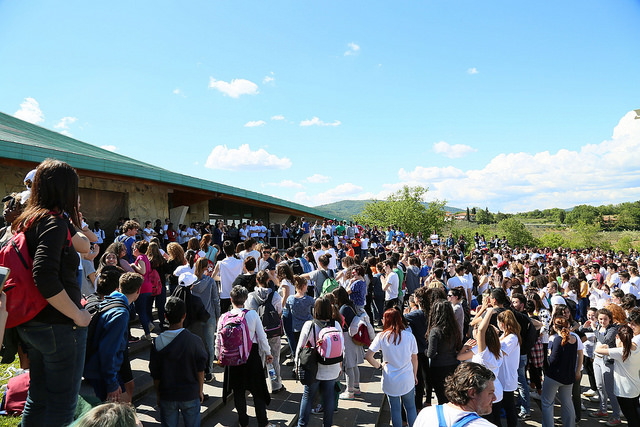 Cristina Guarda, 25, a councilor of the Venice Region, talked about the reasons that drove her to ‘go out there’: “I have always been convinced that politics is what we build when we place ourselves at the service of others. I felt that it was time to get involved.” A phrase of Chiara Lubich introduced the round table that ended the morning. “If you want to transform a city, start by uniting with those who share your ideals. Together, look for the poor, the abandoned, orphans, prisoners, those who are marginalized, and give, always give: a comforting word, a smile, your time, your goods….”. Then came an overview of a variety of ideas-projects of the Youth for a United World in Italy: in Turin, in a small dormitory; in Florence, with a group of prisoners in the Gozzini Jail; in Syracuse, with the Summer Campus that will take place next summer, and which foresees support and recreational activities with problematic children and adolescents; in Naples and Caserta, the project, “Fraternity Workshops,” which has involved hundreds of kids from the peripheries at risk. The afternoon program proceeded with the Expo of the United World Project on disarmaments, the environment, economy of communion, art, culture with the Sophia University Institute, Slotmob, against gambling, intercultural and interreligious dialogue, etc. The day ended with the “FlowRun”: a run in several stages which culminates in an explosion of joy, music and colours, as if to demonstrate that enthusiasm and joy are essential for anyone who wants to attract others in the adventure of a world that is “for” and not “against” something. Source: Focolare-Loppiano nformation Service Photos on Flickr:
Cristina Guarda, 25, a councilor of the Venice Region, talked about the reasons that drove her to ‘go out there’: “I have always been convinced that politics is what we build when we place ourselves at the service of others. I felt that it was time to get involved.” A phrase of Chiara Lubich introduced the round table that ended the morning. “If you want to transform a city, start by uniting with those who share your ideals. Together, look for the poor, the abandoned, orphans, prisoners, those who are marginalized, and give, always give: a comforting word, a smile, your time, your goods….”. Then came an overview of a variety of ideas-projects of the Youth for a United World in Italy: in Turin, in a small dormitory; in Florence, with a group of prisoners in the Gozzini Jail; in Syracuse, with the Summer Campus that will take place next summer, and which foresees support and recreational activities with problematic children and adolescents; in Naples and Caserta, the project, “Fraternity Workshops,” which has involved hundreds of kids from the peripheries at risk. The afternoon program proceeded with the Expo of the United World Project on disarmaments, the environment, economy of communion, art, culture with the Sophia University Institute, Slotmob, against gambling, intercultural and interreligious dialogue, etc. The day ended with the “FlowRun”: a run in several stages which culminates in an explosion of joy, music and colours, as if to demonstrate that enthusiasm and joy are essential for anyone who wants to attract others in the adventure of a world that is “for” and not “against” something. Source: Focolare-Loppiano nformation Service Photos on Flickr: 
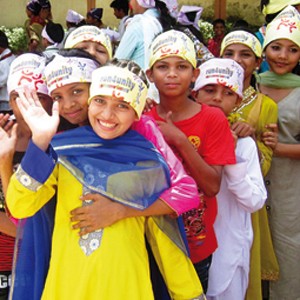
Asia: children and young people run for peace
 Lilia and Paul from Aleppo speak out in the name of their Syrian peers. Their message to the Youth for Unity of Argentina immediately went global: “Thanks, we feel your love and that you share our pain even if you are far. We, the Youth for Unity of Syria, live in three cities: Damascus, Aleppo, and Kfarbo (near Hama). There are 125 of us; 25 are here in Aleppo. There were more of us before, but due to the situation, many friends had to migrate.” It’s the story of Marian, who left for Belgium. She didn’t want to go since all her friends remained in Syria, but had to join her family. «A very important moment for us is the Time Out at 12 noon. We try to pray not only among us, but also with our relatives and friends. One of us proposed this action to a Muslim friend, and so now, at 12, each one prays in his heart, according to his religion. We want to propose it also to all of you, so that peace can be achieved not only in Syria but throughout the world. We love you all!” In Lebanon the United World Week started with the protection of the environment, with an ecological action to clean the beaches, together with #Recycle Lebanon and the Scouts. The theme is strongly felt by the Lebanese Youth for a United World who had already started to act to concretely take care of their own country, starting from the capital of Beirut. They then continued with a film-forum and concluded with a weekend dedicated to the city’s homeless. https://vimeo.com/148202815 In Taiwan, the Run4Unity was held in the north (Taipei), and south (Kaohsiung). In Taipei, also the Vice-President participated. In Southeast Asia they are preparing for an event for young people coming from many countries: Thailand, Korea, Bolivia, Myanmar, Laos, Cambodia, Malaysia, Indonesia and Singapore. At the end of the month there will be a sportive event for teenagers, in the name of Run4Unity. Likewise the run will take place in Manila and Cebu, in the Philippines.
Lilia and Paul from Aleppo speak out in the name of their Syrian peers. Their message to the Youth for Unity of Argentina immediately went global: “Thanks, we feel your love and that you share our pain even if you are far. We, the Youth for Unity of Syria, live in three cities: Damascus, Aleppo, and Kfarbo (near Hama). There are 125 of us; 25 are here in Aleppo. There were more of us before, but due to the situation, many friends had to migrate.” It’s the story of Marian, who left for Belgium. She didn’t want to go since all her friends remained in Syria, but had to join her family. «A very important moment for us is the Time Out at 12 noon. We try to pray not only among us, but also with our relatives and friends. One of us proposed this action to a Muslim friend, and so now, at 12, each one prays in his heart, according to his religion. We want to propose it also to all of you, so that peace can be achieved not only in Syria but throughout the world. We love you all!” In Lebanon the United World Week started with the protection of the environment, with an ecological action to clean the beaches, together with #Recycle Lebanon and the Scouts. The theme is strongly felt by the Lebanese Youth for a United World who had already started to act to concretely take care of their own country, starting from the capital of Beirut. They then continued with a film-forum and concluded with a weekend dedicated to the city’s homeless. https://vimeo.com/148202815 In Taiwan, the Run4Unity was held in the north (Taipei), and south (Kaohsiung). In Taipei, also the Vice-President participated. In Southeast Asia they are preparing for an event for young people coming from many countries: Thailand, Korea, Bolivia, Myanmar, Laos, Cambodia, Malaysia, Indonesia and Singapore. At the end of the month there will be a sportive event for teenagers, in the name of Run4Unity. Likewise the run will take place in Manila and Cebu, in the Philippines.  Many events were held in India which was the hotspot of United World Week in 2015: in Bangalore an International Food Festival was held with over 500 youths, aimed at uniting cultures through food, and also to finance the med-care of Solomon Ellis, a boy who was seriously injured in an accident. In Mumbai, at the YMCA Chembur, a district of the metropolis, there was a mural competition inspired by the theme of peace. Furthermore Run4Unity with games and a short marathon will soon take place. In New Delhi instead, at the Fr Agnel Bal Bhavan in Greater Noida, 300 orphaned children will be involved in various games and sports events to diffuse the Golden Rule .The children, aged between 5 and 17 and from various parts of India and Nepal, belong to diverse religions: Hindus, Christians Muslims and Sikhs. Moreover a Run4Unity link-up with Mexico is programmed for 8 May, since the Mexican sports event held in a symbolic place will conclude precisely in the “Gandhi Park.” In Lahore, Pakistan, activities were held in a school run by the sisters of Mother Theresa: there were 120 children involved by a group of girls who wished to bring them a bit of joy. One of them wrote: “At the start, it was hard to establish a relationship with these children, but in the end, they enjoyed it so much that they no longer wanted to leave. I have changed a lot.” Lastly, preparations are underway in Medan (Indonesia) for a peace concert next 14 May, the funds of which will be allocated to a Country at war. They have been working for months now to gather funds to cover the organizational expenses, by selling fruit juice, singing in restaurants, and looking for sponsors. Through songs and testimonials the youths will share their proposals to become builders of peace in daily life. Maria Chiara De Lorenzo
Many events were held in India which was the hotspot of United World Week in 2015: in Bangalore an International Food Festival was held with over 500 youths, aimed at uniting cultures through food, and also to finance the med-care of Solomon Ellis, a boy who was seriously injured in an accident. In Mumbai, at the YMCA Chembur, a district of the metropolis, there was a mural competition inspired by the theme of peace. Furthermore Run4Unity with games and a short marathon will soon take place. In New Delhi instead, at the Fr Agnel Bal Bhavan in Greater Noida, 300 orphaned children will be involved in various games and sports events to diffuse the Golden Rule .The children, aged between 5 and 17 and from various parts of India and Nepal, belong to diverse religions: Hindus, Christians Muslims and Sikhs. Moreover a Run4Unity link-up with Mexico is programmed for 8 May, since the Mexican sports event held in a symbolic place will conclude precisely in the “Gandhi Park.” In Lahore, Pakistan, activities were held in a school run by the sisters of Mother Theresa: there were 120 children involved by a group of girls who wished to bring them a bit of joy. One of them wrote: “At the start, it was hard to establish a relationship with these children, but in the end, they enjoyed it so much that they no longer wanted to leave. I have changed a lot.” Lastly, preparations are underway in Medan (Indonesia) for a peace concert next 14 May, the funds of which will be allocated to a Country at war. They have been working for months now to gather funds to cover the organizational expenses, by selling fruit juice, singing in restaurants, and looking for sponsors. Through songs and testimonials the youths will share their proposals to become builders of peace in daily life. Maria Chiara De Lorenzo
